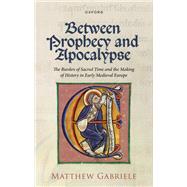Between Prophecy and Apocalypse The Burden of Sacred Time and the Making of History in Early Medieval Europe
, by Gabriele, Matthew- ISBN: 9780199642557 | 0199642559
- Cover: Hardcover
- Copyright: 6/21/2024
The tenth and eleventh centuries in medieval Europe are commonly seen as a time of uncertainty and loss: an age of lawless aristocrats, of weak political authority, of cultural decline and dissolute monks, and of rampant superstition. It is a period often judged from its margins, compared (mostly negatively) to what came before and what would follow. We impose upon it both a sense of nostalgia and a teleology, as they somehow knowingly foreshadow what is to come.
Seeking to complicate this mischaracterisation, which is primarily the invention of nineteenth and early twentieth century historiography, this book maps the movement between two intellectual stances: a shift from prophetic to apocalyptic thinking. Although the roots of this change lay in Late Antiquity, the fulcrum of this transition lies in the tenth and eleventh centuries. Biblical commentators in the fourth and fifth centuries enforced a particular understanding of sacred time that held until the ninth century, when exegetes of the ninth century found in their commentaries a different plan for God's new chosen people. This came into stark relief as the new kingdom of Israel (the Frankish empire under the Carolingians) had splintered in the 840s. God was manifesting his displeasure with the chosen people by fire and sword.
What was perhaps unforeseen was that these commentaries that were written in the specific context of the Carolingian Civil War would be heavily copied and read for the next 200 years. Ideas that formed in a world that actively lamented the loss of empire had to be translated to a world that could only dream of that empire. As they spread across Europe, these ideas became the basis for monastic educational practices, and bled into other types of textual production, such as supposedly "secular" histories.
Between Prophecy and Apocalypse charts an intellectual transformation triggered when the prescriptions laid out towards the end of the Carolingian empire began to be "realized" in subsequent centuries. Nostalgia entwined with an attentiveness to possible futures and spun together so tightly as to become a double helix. Ultimately, this book will offer a way to understand the central Middle Ages, a period of dynamic intellectual ferment when ideas could inspire action and (seemingly banal) conceptions of time and history could inspire moments of dramatic transformation and horrific violence.
Seeking to complicate this mischaracterisation, which is primarily the invention of nineteenth and early twentieth century historiography, this book maps the movement between two intellectual stances: a shift from prophetic to apocalyptic thinking. Although the roots of this change lay in Late Antiquity, the fulcrum of this transition lies in the tenth and eleventh centuries. Biblical commentators in the fourth and fifth centuries enforced a particular understanding of sacred time that held until the ninth century, when exegetes of the ninth century found in their commentaries a different plan for God's new chosen people. This came into stark relief as the new kingdom of Israel (the Frankish empire under the Carolingians) had splintered in the 840s. God was manifesting his displeasure with the chosen people by fire and sword.
What was perhaps unforeseen was that these commentaries that were written in the specific context of the Carolingian Civil War would be heavily copied and read for the next 200 years. Ideas that formed in a world that actively lamented the loss of empire had to be translated to a world that could only dream of that empire. As they spread across Europe, these ideas became the basis for monastic educational practices, and bled into other types of textual production, such as supposedly "secular" histories.
Between Prophecy and Apocalypse charts an intellectual transformation triggered when the prescriptions laid out towards the end of the Carolingian empire began to be "realized" in subsequent centuries. Nostalgia entwined with an attentiveness to possible futures and spun together so tightly as to become a double helix. Ultimately, this book will offer a way to understand the central Middle Ages, a period of dynamic intellectual ferment when ideas could inspire action and (seemingly banal) conceptions of time and history could inspire moments of dramatic transformation and horrific violence.






